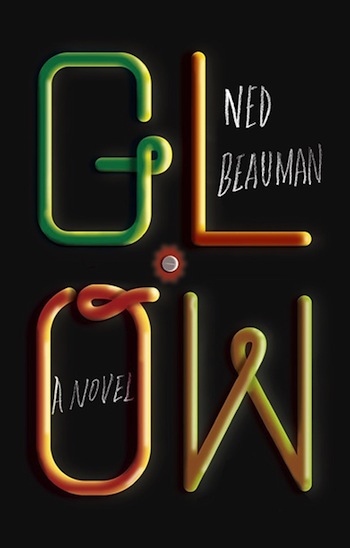Book Review: Ned Beauman’s Unconventional “Glow”
Glow is a witty, accessible, but at times overly ambitious journey through the world of exotic drugs, the chemistry of romance, and the insidious effects of globalization.
Glow by Ned Beauman. Knopf, 256pp., $25.95.
By Matt Hanson

In the past five years, British novelist and journalist Ned Beauman has steadily established himself as a writer to watch. His 2010 debut Boxer, Beetle and 2012’s The Teleportation Accident received rave reviews and accumulated nominations for a number of impressive awards — the latter even made the long list for the Man Booker Prize. Beauman was also named one of Granta’s Best British Novelists at the precocious age of 29. Glow, his newly published third novel, doesn’t quite make good on the proclamations of promise: it is a witty, accessible, but at times overly ambitious journey through the world of exotic drugs, the chemistry of romance, and the insidious effects of globalization.
The story begins with Raf, a good-natured London slacker with a rare sleep disorder (his body runs on a 25 hour circadian rhythm) who has his hands on a “wonton-sized” piece of a mysterious drug called ‘glow’ at a midnight rave held in a Laundromat in South London. It’s rumored to be the ultimate high, but for some reason the ordinarily drug-friendly Raf doesn’t jump at the chance to take it. Gazing across the crowded dance floor, he’s suddenly intoxicated with something else entirely.
This would be Cherish, a young Burmese-American expat who grabs Raf’s attention (as well as his colorful new pill) and whose various and enigmatic motivations supply much of the novel’s narrative energy. Their courtship is suspiciously spontaneous; Cherish’s intentions towards Raf are obscure at best. Early on, Cherish matter-of-factly explains to her befuddled bedmate that she takes pills to stop her body’s natural chemical compulsion for post-coital bonding. She casually leaves his bachelor pad before there’s a chance for Raf to inquire further.
Suddenly, Raf begins to notice windowless white vans appearing and disappearing around familiar street corners. When a friend suddenly goes missing, Raf sets out to investigate and accidentally uncovers a vast international conspiracy lurking beyond his innocently hazy world. The hapless Raf gradually discovers that the pill now in Cherish’s possession is connected to a much scarier and more sinister network. Glow is far more than just a hip, underground party drug; it’s actually potentially lucrative enough to attract the attention of a mysterious, ruthless, Halliburton-like American corporation named Lacebark.
It just so happens that the primary source of the drug’s chemical composition is native to Cherish’s hometown of Gandayaw, a Burmese mining village. Lacebark, having already picked the village’s raw materials clean, has become interested in expanding its financial portfolio by moving, big time, into the huge market for new-fangled exotic drugs. The narrative then zig-zags across the globe, via London, Burma, and Iceland, as Raf attempts to uncover the truth about Lacebark’s nefarious agenda, glow’s origin, and Cherish’s true romantic inclinations.
Beauman is admirably determined to keep all of these narrative threads together, but there’s a sticky problem: the suspense plot thickens to the point of overload so Glow‘s potentially bright and shiny critique points about multi-international economic thuggery are lost in the narrative shuffle. Yes, the intricately detailed narrative keeps the reader turning the pages, but the deeper questions that Beauman clearly wants this thriller to ask – about the amoral nature of global capitalism, the essentially chemical influence of human attraction, the need for human relationships in a synthetic world – don’t resonate as deeply as they should.

Author Ned Beauman — admirably determined to keep all of his latest novel’s narrative threads together.
Raf is a likeable enough protagonist, but his hangdog shallowness isn’t capable of generating the kind of romantic interest in Cherish that is necessary to drive a large portion of the storyline. And his amateur sleuthing, amusing as it can be, becomes distractingly implausible, as when the perpetually stoned Raf bluffs his way into one of Lacebark’s battle simulators and manages not only to explicate some further plot points but also lives to tell the tale. Cherish is divided between two increasingly hostile worlds, which arguably makes her the novel’s most intriguing character, but her complexity is undermined when her quirks and secrets end up driving the ever-contorting dramatic demands of the narrative machinations rather than developing our sense of her as a fully-rounded character.
Where Glow truly shines is in the freshness of its language. Beauman’s writing is filled with distinctive touches – an imaginative simile, wherein the moon is “a silver pill half dissolved in the tongue of the night” or a catchy, insightful phrase, such as describing modern paranoia as “a fear in a brain in a head in a hood in a call in a warehouse in the city.” At his best, Beauman has a Martin Amis-like flair for avoiding of cliché as well as a knack for describing some of the morally murky aspects of the world we inhabit in a way that make them fresh and shocking.
This is only Beauman’s third novel, so it’s early in his career — there’s plenty of time for his talent to ripen. Glow offers plenty of evidence that the Cambridge philosophy major is interested in important contemporary issues and his willingness to use genre (in this case the thriller) to tackle major themes. Once his storytelling chops and sense of characterization equal his levity and skill with language, Beauman will have proved that he was well worth watching.
Matt Hanson is a critic for the Arts Fuse living outside Boston. His writing has appeared in The Millions, 3QuarksDaily and Flak Magazine (RIP), where he was a staff writer. He blogs about movies and culture for LoveMoneyClothes. His poetry chapbook was published by Rhinologic Press.

Although this writer presents such a penetrating and insightful critique of the shortcomings of this novel, my response slowly blossoms into an even stronger desire to read it.
Hanson succeeds in rendering a balanced account which takes into consideration both the weaknesses and the promise of Glow. Although it seems disappointing that the author is not quite able to utilize characterization in a way that always makes sense or adequately serves the story, the critic nonetheless seems to believe that characterization is also one of Beauman’s strong points. I am also drawn in by his description of Beauman’s writing style and sometimes his exquisite use of language.
However what really has commanded my attention is Hanson’s explanation of the author’s attempt to comment meaningfully on the impact of global capitalism in contemporary society within a novel and produce an outcome does not sacrifice literary quality. Although that sounds like an awfully dull premise for a story, contemporary fiction is saturated by such attempts, many of them successful and quite literary (Adiga’s White Tiger). This trend in literature addresses the human condition in general, but is more identifiably political than in previous eras in that it is less generally and more specifically historical, naming actual events and living political actors. So much of it is from the UK and is being written by both the Anglo writers and those of colonial descent. It seem to have originated a generation or so during the Thatcher years, in both literature and music. This wave included everyone from Elvis Costello and The Clash to Amis, Hitchens, Roy, Hollingshead, Coe, et al. An endless list — Ah, Maggie the Muse. And as the impact of Globalization, 9/11, etc. penetrated our own daily lives, it has also come to inhabit our side of the Pond we can see its influence upon American literature. Actually, that’s a bit simplistic. I view it as worldwide trend — and nothing new, but more intense and specific
And Hanson’s description of the specific impact of Glow is stunning — for the author is praised for skill in “…directing some of the morally murky aspects of the world I a way which makes them fresh and shocking.”
So if do not buy this book, it will definitely be worth a trip to the library pretty soon.
Well done Lucinda! So cool of you to include the Thatcher era musicians. Remember a couple of years ago when she checked out? Wall to wall anti-Thatcher songs that had been written twenty-five years before her demise on the radio all day for almost a week! I damn near laughed my ass off.
Yrs,
Junior
“[…] but the deeper questions that Beauman clearly wants this thriller to ask – about the amoral nature of global capitalism, the essentially chemical influence of human attraction, the need for human relationships in a synthetic world – don’t resonate as deeply as they should.”
I want to read the book that does do this with commensurate depth. Maybe Beauman will be the one to deliver it. Some day.
Excellent critique!